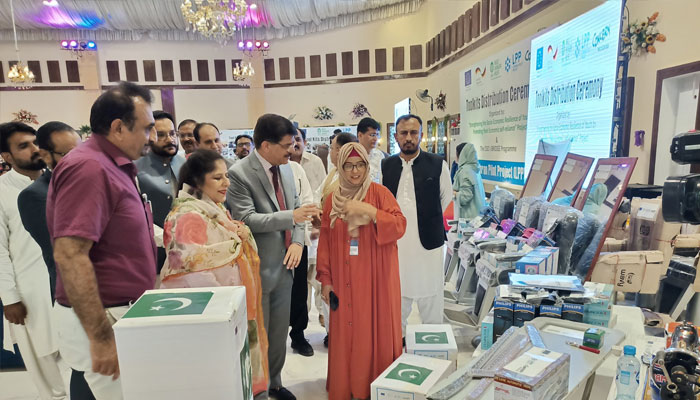Lodhran Pilot Project empowers youth through skills development
LAHORE: In an era where unemployment and poverty remain pressing challenges in Pakistan, the project “Strengthening the Socio-Economic Resilience of Youth by Promoting Their Economic Self-Reliance” has emerged as a transformative initiative. Implemented across three provinces - Punjab, Khyber Pakhtunkhwa, and Sindh - the project aims to equip youth aged 18–29 with employable skills to ensure a self-reliant and dignified future.
In Punjab, the Lodhran Pilot Project (LPP), with the support of the German organisation Deutsche Welthungerhilfe (WHH) and co-financing by the German Federal Ministry for Economic Cooperation and Development (BMZ), successfully executed this initiative across Bahawalpur, Rahim Yar Khan, and Bahawalnagar districts. A total of 1,334 youth—including 787 males, 532 females, and individuals from minority and marginalised communities—were empowered with vocational skills and technical training to support job placements and entrepreneurship ventures.
A research-first approach ensured the project's relevance to evolving market demands. Conducted in partnership with The Islamia University of Bahawalpur, the study identified in-demand skills, including freelancing, digital marketing, e-commerce, and graphic designing under the service sector, while trades like HVACR (Heating, Ventilation, and Air Conditioning) and industrial electrician emerged as high-demand opportunities in manufacturing. Conventional trades such as beautician services, dressmaking, and electrician training also resonated with many youth participants.
In response to the findings, LPP collaborated with leading institutions like the Technical Education Vocational Training Authority (TEVTA) and private Training Service Providers (TSPs), including the College of Tourism and Hotel Management (COTHM), Heritage International College, and Jinnah Institute of Technology. Through these partnerships, youth accessed state-of-the-art training programs aligned with both their interests and job market needs.
To ensure outreach, LPP ran large-scale awareness campaigns through newspapers, social media platforms, FM Radio, and on-ground mobilisation drives. Working closely with Civil Society Organisations (CSOs), the project successfully reached marginalised communities and ensured inclusivity. Special emphasis was placed on participants from minority groups and persons with disabilities; 27 youth from minority backgrounds and 8 individuals with disabilities benefited from skill-based training tailored to their interests.
Accountability and transparency remained cornerstones of the project. LPP implemented a Complaint Response Mechanism (CRM), organising 300 community-level sessions to guide stakeholders on grievance redressal procedures. Visibility boards displaying project details and contact numbers were placed at training centers, ensuring communities remained informed and engaged.
As a result of these concerted efforts, skilled graduates now play a significant role in supporting their families. Youth trained in HVACR, industrial electrics, and other trades have successfully entered manufacturing markets, while those completing digital courses like freelancing and e-commerce - are earning sustainable incomes, often working remotely.
-
 All You Need To Know Guide To Rosacea
All You Need To Know Guide To Rosacea -
 Princess Diana's Brother 'handed Over' Althorp House To Marion And Her Family
Princess Diana's Brother 'handed Over' Althorp House To Marion And Her Family -
 Trump Mobile T1 Phone Resurfaces With New Specs, Higher Price
Trump Mobile T1 Phone Resurfaces With New Specs, Higher Price -
 Factory Explosion In North China Leaves Eight Dead
Factory Explosion In North China Leaves Eight Dead -
 Blac Chyna Opens Up About Her Kids: ‘Disturb Their Inner Child'
Blac Chyna Opens Up About Her Kids: ‘Disturb Their Inner Child' -
 Winter Olympics 2026: Milan Protestors Rally Against The Games As Environmentally, Economically ‘unsustainable’
Winter Olympics 2026: Milan Protestors Rally Against The Games As Environmentally, Economically ‘unsustainable’ -
 How Long Is The Super Bowl? Average Game Time And Halftime Show Explained
How Long Is The Super Bowl? Average Game Time And Halftime Show Explained -
 Natasha Bure Makes Stunning Confession About Her Marriage To Bradley Steven Perry
Natasha Bure Makes Stunning Confession About Her Marriage To Bradley Steven Perry -
 ChatGPT Caricature Prompts Are Going Viral. Here’s List You Must Try
ChatGPT Caricature Prompts Are Going Viral. Here’s List You Must Try -
 James Pearce Jr. Arrested In Florida After Alleged Domestic Dispute, Falcons Respond
James Pearce Jr. Arrested In Florida After Alleged Domestic Dispute, Falcons Respond -
 Cavaliers Vs Kings: James Harden Shines Late In Cleveland Debut Win
Cavaliers Vs Kings: James Harden Shines Late In Cleveland Debut Win -
 2026 Winter Olympics Snowboarding: Su Yiming Wins Bronze And Completes Medal Set
2026 Winter Olympics Snowboarding: Su Yiming Wins Bronze And Completes Medal Set -
 Trump Hosts Honduran President Nasry Asfura At Mar-a-Lago To Discuss Trade, Security
Trump Hosts Honduran President Nasry Asfura At Mar-a-Lago To Discuss Trade, Security -
 Cuba-Canada Travel Advisory Raises Concerns As Visitor Numbers Decline
Cuba-Canada Travel Advisory Raises Concerns As Visitor Numbers Decline -
 Anthropic Buys 'Super Bowl' Ads To Slam OpenAI’s ChatGPT Ad Strategy
Anthropic Buys 'Super Bowl' Ads To Slam OpenAI’s ChatGPT Ad Strategy -
 Prevent Cancer With These Simple Lifestyle Changes
Prevent Cancer With These Simple Lifestyle Changes




